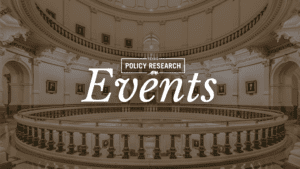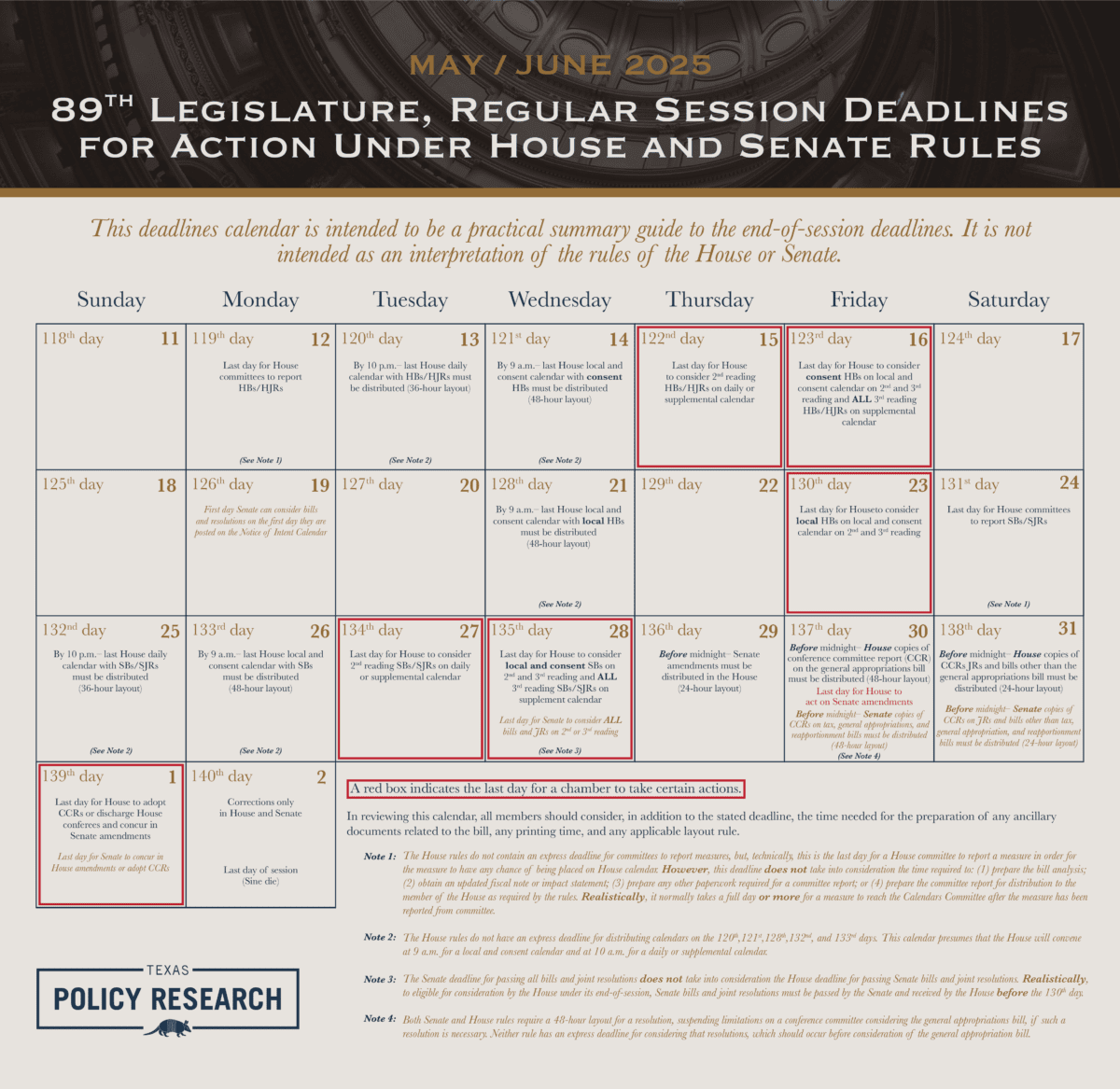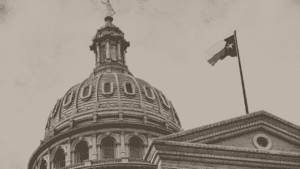Howdy!
With the bill filing deadline just a week away on Friday, March 14th, we’re bracing for a flurry of last-minute filings as lawmakers rush to get their priorities on the table. Expect a wave of new proposals covering everything from tax policy and public safety to education and government reform. As the deadline approaches, the sheer volume of bills will make it clear which issues are gaining momentum—and which ones may not make the cut this session.
Meanwhile, the legislative priorities of both Lieutenant Governor Dan Patrick and Speaker Dustin Burrows continue to advance through the committee process. Key measures on education, border security, and taxpayer protections are moving forward, setting the stage for major debates in the coming weeks. With the session in full swing, now is the time to stay informed and engaged. In this week’s Gavel to Gavel, we break down the latest updates, committee actions, and what’s ahead for Texas’ most pressing legislative battles. Let’s dive in!
For Liberty, For Texas
Jeramy D. Kitchen
President, Texas Policy Research
Featured

Texans Show Strong Support for Education Savings Accounts in New Polling Data
A recent survey by Texas Southern University’s Barbara Jordan Public Policy Research & Survey Center reveals that 63% of Texans support universal Education Savings Accounts (ESAs), enabling all parents to access state funds for alternative educational options such as private schools, online learning, and specialized programs. This support spans various demographics, with 69% of Black Texans, 62% of White Texans, and 59% of Latino Texans in favor. Politically, 78% of Republicans, 64% of Independents, and 46% of Democrats back universal ESAs, indicating bipartisan interest in expanding school choice.
In contrast, the survey found that only 45% of Texans support income-restricted ESAs, which would provide funds exclusively to families earning under $50,000 per year. This suggests a preference for broader ESA programs that include families of all income levels. Support for income-restricted ESAs varies across racial and political groups: 61% of Black Texans support restricted ESAs, compared to 44% of Latino Texans and 42% of White Texans. Among Republicans, support drops significantly to 50% for income-restricted ESAs, compared to 78% for universal ESAs. Meanwhile, Democratic support remains steady, with 43% backing both universal and restricted ESAs.
End of Session Deadlines
With just one week until the bill filing deadline on March 14th, the clock is ticking for lawmakers to introduce new legislation. But that’s just the beginning—several key deadlines will shape the remainder of the session, determining which bills survive and which ones stall out. Staying ahead of these critical dates is essential for anyone following the legislative process.
To help you track what’s next, we’ve put together a comprehensive legislative calendar that outlines every major deadline between now and sine die. You can view the full calendar and download a PDF tracker to keep tabs on upcoming cutoffs. Don’t miss a key deadline!
Other Recent Content
Legislative Spotlight:
House Bill 2 – What it Means for Texas Schools
- House Bill 2 (HB 2), introduced by State Representative Brad Buckley, proposes significant changes to Texas’ public education system. The bill aims to increase the basic allotment per student from $6,160 to $6,380, expand teacher incentive programs, and provide additional grant funding for various school initiatives. While these measures seek to address funding disparities and enhance educational outcomes, some critics argue that HB 2 reinforces the existing government-run school system without implementing necessary structural reforms or efficiency measures.
- Key provisions of HB 2 include adjustments to charter school funding, expansion of state-funded pre-kindergarten eligibility to all three-year-olds meeting certain conditions, and significant pay raises for public school teachers based on a state-run performance designation system. The bill also introduces additional funding streams for school districts, such as a High School Advising Allotment and a Fine Arts Allotment. Critics express concerns that these provisions may increase state control over education and undermine the effectiveness of school choice initiatives by solidifying the dominance of government-run education.
Texas’ Dementia Prevention and Research Institute:
A Costly Overreach in the Wrong Direction
- The proposed establishment of the Dementia Prevention and Research Institute of Texas (DPRIT) through Senate Bill 5 (SB 5) and House Bill 5 (HB 5) has raised significant concerns regarding government overreach and fiscal responsibility. Critics argue that creating a new state-run institute duplicates existing efforts by private and nonprofit research organizations, leading to unnecessary bureaucracy and potential inefficiencies. The initiative’s structure, modeled after the Cancer Prevention and Research Institute of Texas (CPRIT), is troubling to some due to CPRIT’s history of mismanagement and scandals. The proposed funding mechanism for DPRIT lacks explicit spending caps, potentially opening the door to unchecked financial commitments from taxpayers.
- Opponents also highlight that Texas already hosts world-class research institutions capable of conducting dementia research without additional state intervention. They caution that establishing DPRIT could lead to government inefficiency and cronyism, diverting resources from other critical areas. The absence of clear spending limits and the potential for expanding bureaucracy raise questions about the state’s role in funding and managing medical research. Given these concerns, some suggest that lawmakers should reconsider the necessity and structure of DPRIT to avoid repeating past mistakes associated with similar initiatives.
Texas’ Economic Development Strategy:
A Roadmap or Government Overreach?
- The “Bigger. Better. Texas.” strategic plan for 2025-2029, developed by the Texas Economic Development & Tourism Office under the Governor’s direction, aims to maintain and expand Texas’ economic strength by focusing on business expansion, innovation, workforce development, and infrastructure investment. The plan identifies key sectors such as semiconductor manufacturing, artificial intelligence, and renewable energy as priorities for investment and incentives.
- However, critics argue that direct government involvement in business attraction and industry development risks overstepping the bounds of limited government. They contend that while addressing infrastructure and workforce training are reasonable priorities, market forces should dictate the state’s economic future rather than state-led initiatives.
Floor Reports
For every bill placed on a calendar in both chambers of the Texas Legislature, we issue a floor report detailing the bill’s intent, its fiscal implications, and our vote recommendations to state lawmakers based on our five liberty principles. Below are the Floor Reports we published this week:
In Case You Missed It
Will Texas Finally End Taxpayer-Funded Lobbying?
A Look at the 89th Legislature’s Efforts
- The 89th Texas Legislature is pushing to ban taxpayer-funded lobbying, a practice where local governments use public money to influence state policy. SB 19 by Sen. Mayes Middleton and HB 3257 by Rep. Mike Olcott would prohibit cities, counties, and school districts from hiring lobbyists or funding associations that lobby on their behalf. Supporters argue this would stop taxpayer money from being used against the interests of those funding government.
- Opposition remains strong from groups like the Texas Municipal League and Texas Association of Counties, which argue lobbying helps local governments advocate for their communities. Speaker Dustin Burrows’ past support for similar measures has given backers hope for passage, but the fight against entrenched interests will be tough.
Filed Legislation Summaries
- We have read through all of the filed legislation for the 89th Legislative Session. While lawmakers will continue filing new bills—and we’ll continue analyzing them—we’ve already compiled summaries of each piece of legislation to give you a head start. These summaries are just the beginning as we gear up for our next round of in-depth policy analysis and prepare our more comprehensive floor reports as the session is underway.
Upcoming Events

Texas Policy Research is proud to partner with organizations and groups across Texas to share insights and expertise. Here’s where you can find us next:
- Richardson Republican Women
- When: Wednesday, April 16th, 2025 at 6:00 pm
- Where: Spring Creek BBQ, 270 N. Central Expy, Richardson, TX 75080
- Topic(s): 89th Legislative Session Update
- RED Texas Forum
- When: Thursday, May 15th, 2025 at 7:30 pm
- Where: La Prada Church of Christ, 2724 La Prada Dr., Mesquite, TX 75150
- Topic(s): Texas Legislative Process & 89th Legislative Session Update
Want a Speaker at Your Event?
Bring Texas Policy Research to your next event! Our team is available to speak on a variety of topics, including the Texas legislative process, engaging with lawmakers, and policy updates. Submit your request today here.
Legislative Countdowns
Bill Filing Deadline: 7 Days
89th Legislative Session Ends: 87 Days
Texas Policy Research relies on the support of generous donors across Texas.
If you found this information helpful, please consider supporting our efforts! Thank you!











